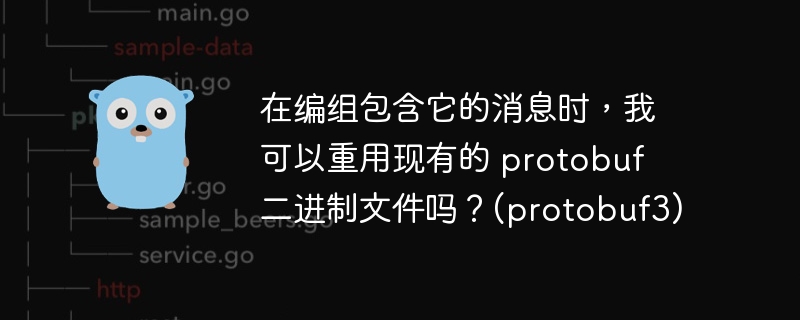

protobuf is defined as follows:
syntax = "proto3"
message hugemessage {
// omitted
}
message request {
string name = 1;
hugemessage payload = 2;
}
In one case, I received a hugemessage from someone and I wanted to pack it with additional fields and then transmit that message to someone else. So I have to hugemessage the binary unmarshal into a go structure, package it into a request and then marshal# it again ##. Due to the hgue size of hugemessage, the cost of unmarshal and marshal is prohibitive. So can I reuse the hugemessage binary without changing the protobuf definition?
func main() {
// receive it from file or network, not important.
bins, _ := os.ReadFile("hugeMessage.dump")
var message HugeMessage
_ = proto.Unmarshal(bins, &message) // slow
request := Request{
name: "xxxx",
payload: message,
}
requestBinary, _ := proto.Marshal(&request) // slow
// send it.
os.WriteFile("request.dump", requestBinary, 0644)
}
The most obvious strategy is to do it the way you currently do it - unmarshal
hugemessage, set it to request, and then marshal again. The Golang protobuf API surface doesn't really provide a way to do more - and for good reason.
ways to achieve what you want to do. But these aren't necessarily safe or reliable, so you have to weigh that cost against what you have now.
One way to avoid unmarshalling is to take advantage of the way messages are normally serialized;
message request {
string name = 1;
hugemessage payload = 2;
}
message request {
string name = 1;
bytes payload = 2;
}payload contains the results of calling marshal(...) against some hugemessage.
syntax = "proto3";
message hugemessage {
bytes field1 = 1;
string field2 = 2;
int64 field3 = 3;
}
message request {
string name = 1;
hugemessage payload = 2;
}
message rawrequest {
string name = 1;
bytes payload = 2;
}
req1, err := proto.Marshal(&pb.Request{
Name: "name",
Payload: &pb.HugeMessage{
Field1: []byte{1, 2, 3},
Field2: "test",
Field3: 948414,
},
})
if err != nil {
panic(err)
}
huge, err := proto.Marshal(&pb.HugeMessage{
Field1: []byte{1, 2, 3},
Field2: "test",
Field3: 948414,
})
if err != nil {
panic(err)
}
req2, err := proto.Marshal(&pb.RawRequest{
Name: "name",
Payload: huge,
})
if err != nil {
panic(err)
}
fmt.Printf("equal? %t\n", bytes.Equal(req1, req2))equal? true
rawrequest type must exactly mirror the request type, which is not ideal.
protowire package - again, feel free, caution is recommended.
The above is the detailed content of Can I reuse an existing protobuf binary when marshalling the messages containing it? (protobuf3). For more information, please follow other related articles on the PHP Chinese website!
 js string to array
js string to array
 How to get the address bar address
How to get the address bar address
 Why do all the icons in the lower right corner of win10 show up?
Why do all the icons in the lower right corner of win10 show up?
 Which platform is better for virtual currency trading?
Which platform is better for virtual currency trading?
 Digital currency trading app
Digital currency trading app
 Why is there no response when headphones are plugged into the computer?
Why is there no response when headphones are plugged into the computer?
 The difference between arrow functions and ordinary functions
The difference between arrow functions and ordinary functions
 Dogecoin latest price today
Dogecoin latest price today




